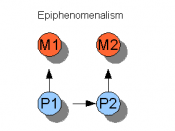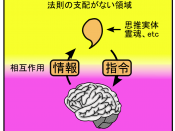In this paper I will argue that William Hasker's theory of the Emergent Individual is superior to John Foster's Cartesian Dualism in explaining mind-body interaction. I will begin with an explanation of Cartesian Dualism and how it proposes to solve the problem of mind-body interaction. Then I will explain the idea of the Emergent Individual and why it is superior to Cartesian Dualism. A critical analysis of the Emergent Individual will also be discussed and replies to these criticisms will be made. In conclusion I will demonstrate why the idea of the Emergent Individual is superior to Cartesian Dualism.
Cartesian Dualism maintains that the mind is an entirely immaterial entity that is separate from the body (Foster,15). Therefore, Cartesian Dualism claims that the mind is not dependent on the human body in any way. The idea that the mind is not dependent on the body rests on three claims.
The first claim of Cartesian Dualism is that the mental is fundamental and cannot be reduced to the physical (Foster, 15). The Cartesian Dualist does not see how two completely different items, one immaterial and the other material, can be the same. Both items are qualitatively different (Foster). Therefore, that which is immaterial cannot be reduced to the material and the material cannot be the constructive basis of the immaterial.
The second claim of Cartesian Dualism is that mental items such as feelings and thoughts are elements possessed by a mental subject (Foster, 15). For example, we cannot imagine pain without a sufferer (Foster, 17). Without the subjective experience of pain or another emotion we would not be able to recognize the feeling mentally. Foster appeals to our commonsense perspective of subjective experience and claims that it is impossible to imagine otherwise (Foster, 17).
The third claim of...


